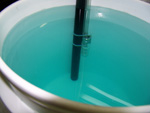
By Virginie Buck,
Dosatron International
Everyone knows that water-powered medicators are the easiest way to administer a wide variety of medications, vaccinations and supplements. But after you buy a medicator, there are several things you can do to make sure you get the most bang for your buck from your equipment, and that it will last a long time.
When installing your medicator, be sure to plumb an 80 micron/200 mesh filter on the inlet side of the medicator. This will ensure that your medicator will be protected from poor water quality conditions that can potentially damage your unit. This will also protect any equipment you have downstream from the medicator, such as nipples, valves, and drinkers, from getting clogged and wearing out prematurely.
Also, make sure that your concentrate bucket is clean and free from debris that could get sucked up inside the medicator and jam the check valve. A good rule of thumb is to secure your hose at least 4” up from the bottom of the stock tank so that heavy debris is not sucked up into the medicator.
Always be sure that your maximum flow rate stays within the maximum capacity of your medicator. Be sure to check with your medicator’s manufacturer for specifications and for ways to determine flow rate. If you determine that your flow rate is higher than the maximum recommended, you may want to consider switching to a model with a higher maximum flow rate. Turning your water on slowly will gradually pressurize the system, helping to prevent a rush of water through the pipes that could be harmful to the equipment.
One of the most important things you can do to protect your medicator is to keep up the medicator’s maintenance schedule, which you should be able to get from your medicator’s manufacturer.
Flushing your medicator with clear water may be the single most important tip I can give.
Medicators are one of the most important weapons in your arsenal when it comes to keeping your animals as healthy as possible. By following these simple best practices, you’ll make sure that your medicator continues to work hard for you for years to come.












 Україна
Україна Méjico
Méjico



